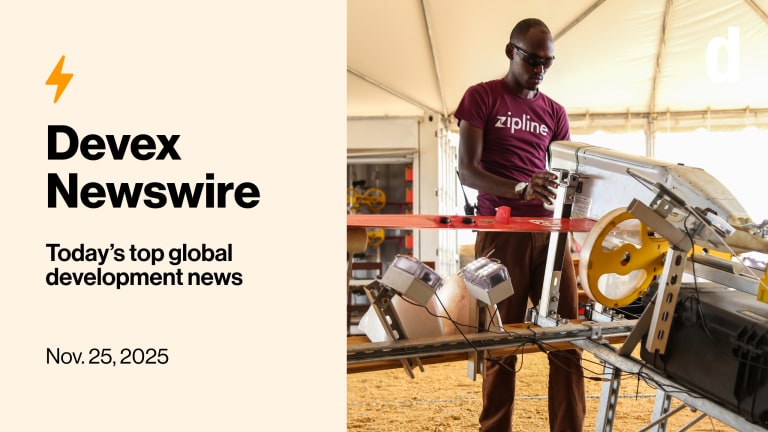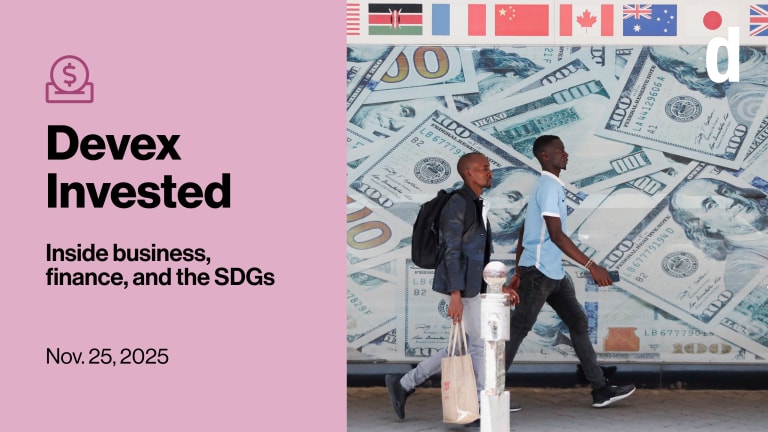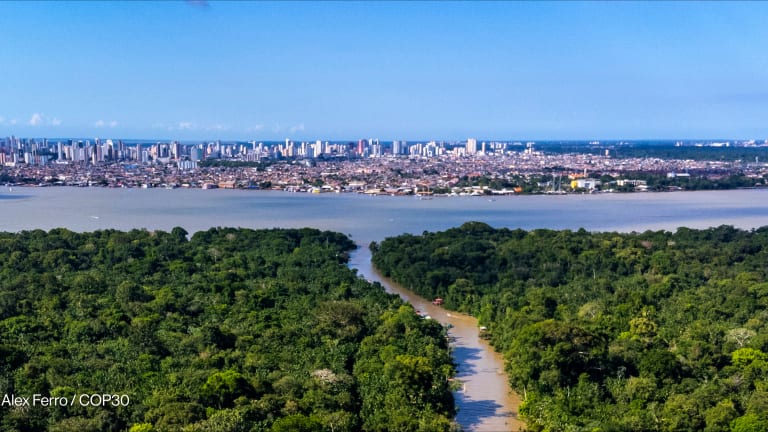Scoop: First look at draft text for Macron's global financing summit
Three weeks out, organizers are still deciding whether to try and negotiate a joint text.
Just 20 days out, a much-hyped summit from French President Emmanuel Macron designed to strike a new deal between wealthy nations and the rest of the world is so far big on calls for action but light on commitments, according to a possible declaration outline, seen by Devex. The four-page text, titled “Structure and options for a possible declaration,” was shared with the steering group for the Paris summit, including officials from the United States, European Commission, China, Brazil, South Africa, United Nations, International Monetary Fund, and others. France and India, which currently holds the presidency of the G20, are leading preparations for the June 22-23 event, announced by President Macron last year with the aim of reaching “a new financial pact with the [global] South.” Low-income countries are increasingly calling for progress on issues such as debt relief, while expressing anger at wealthy nations’ inability to meet existing global commitments, such as the agreed target of providing $100 billion in climate finance each year. Goal-setting Organizers are still deciding whether to issue a declaration, wary of the onerous word-by-word negotiations that would entail. The draft declaration seen by Devex was intended as a basis for internal discussions on the steering committee, an Elysée official told Devex Thursday, adding that the final format and conclusions of the summit are still “up for debate.” The draft document evokes familiar themes. “The greatest challenge is to address new needs (global public goods and vulnerability) without diverting resources from the poor,” it states, echoing the spirit of the Bridgetown Agenda championed by Barbados Prime Minister Mia Mottley, who is also involved in planning the summit. Under the section on “Climate, Finance and Development,” the draft advocates “differentiated pathways of transition according to national circumstances and priorities, defined nationally.” But the text also provides insight into the still-unresolved issues. Italicized passages ask: • On blended finance: “What kind of principles/limits to blending: additionality? Subsidiarity?” • On innovative finance mechanisms: “Establish [a] process for review and policy discussion? Point to some specific directions?” • On certifying decarbonized investments: “Should multilateral institutions — the World Bank — take an increased role?” • And on vertical funds (the financing mechanisms backed by multiple donors on a specific theme, such as GAVI, the Vaccine Alliance): “Is there a road to some rationalisation? At least the vertical funds could contribute with their concessional resources to the action of MDBs supporting global public goods. (Governments must balance the benefits of diversity, additionality, and efficiency when they set up vertical and trust funds. The dangers of too much dispersion in concessional money. Are [there] prospects for leveraging?).” Reuters reported last week that one plan under consideration was to use multilateral development banks, or MDBs, and the IMF to provide $100 billion per year of foreign exchange guarantees in order to help low-income countries pay for environmentally friendly projects. That idea features in a section of the draft on “follow-up and avenues for the future,” alongside other ideas to “develop carbon credit markets (integrity, efficiency, scale)” and “look forward to outcomes from the G20 under India’s Presidency.” Devex reported earlier this year that Macron wanted this summit to generate “ambitious decisions” on a range of topics, from how to give low-income countries greater fiscal space, to increasing green investment and boosting the private sector. The Elysée official said that anticipated deliverables so far include a roadmap for MDB reform; a framework for suspending debt repayments for countries hit by natural disasters; a stocktaking of how wealthy countries are doing at rechanneling their allocation of Special Drawing Rights from the IMF; new avenues for rechanneling SDRs; and showcasing and possibly announcing new Just Energy Transition Partnerships, such as those recently agreed between Western countries and South Africa and Vietnam. The road to Paris French organizers have parceled out information about the event through webinars and briefings in recent months. Now, invites have gone out to world leaders, and a website is live — but some following the process are wondering whether the event will live up to the hype. “How many roadmaps do we need?” an EU source familiar with the deliberations told Devex. “France is all over the place.” The Elysée official said the summit would seek to give a “political impulse” to the recent G20 report on MDBs’ capital requirements. Lenders such as the World Bank, European Investment Bank, and European Bank for Reconstruction and Development have been discussing that agenda for months. “The MDBs are the engine which are going to fuel this global agenda and we have to make sure we give them enough fuel,” the official said. And at the same time, the summit will also focus on what should be done with that extra funding for MDBs. The aim, the official said, is to move away from a “project-by-project micromanagement” approach and basing MDBs’ work instead on country platforms “with a politically defined agenda that we are going to help them implement.” Déjà vu Many of the meeting’s themes are familiar from a May 2021 summit in Paris on financing African economies, which also pushed — so far largely unsuccessfully — for wealthy countries to rechannel Special Drawing Rights from the IMF, issued in the wake of the COVID-19 pandemic to low-income countries, and launched an Alliance for Entrepreneurship in Africa. “This summit in June will take stock of all of this work — on climate, on nature, on poverty, on financing vulnerability — [and] making sure that we are up to our commitments,” the official said. “We will come back to the SDR commitment, we will come back to the $100 billion climate finance commitment, we will come back to the debt restructuring agenda. All of this requires all partners to contribute and to be up to their responsibility. And based on this, we will try to draw together the roadmap, the vision, for the months and years to come.” New world order The aim might be to bring the world together, but when it comes to multilateralism these days, it can look more like it’s coming apart. The foreign ministers of the BRICS group of nations — Brazil, Russia, India, China, and South Africa — met in Cape Town this week. Indian Minister of External Affairs Subrahmanyam Jaishankar said the message there was that “the world is multipolar, that it is rebalancing and that old ways cannot address new situations." At the same time, some of the shibboleths of global development are shaking too. Outgoing World Bank President David Malpass told Devex this week that the logic of turning billions of aid dollars into trillions in private investment had failed because “there was a huge focus on pledges, but not enough focus on the mechanisms for encouraging inflows.” And a Reuters investigation this week showed that donors are counting support for the likes of coal plants, hotels, and chocolate stores abroad toward their spending on climate finance. For Europe and the United States, it is the war in Ukraine and its hefty reconstruction cost which are front-of-mind for many policymakers, not the global south. In that light, June’s summit may be viewed as a success by some merely by virtue of it happening at all. However, that is unlikely to satisfy the governments of low-income countries most at risk from climate change, all of whom have heard much of this rhetoric before.
Just 20 days out, a much-hyped summit from French President Emmanuel Macron designed to strike a new deal between wealthy nations and the rest of the world is so far big on calls for action but light on commitments, according to a possible declaration outline, seen by Devex.
The four-page text, titled “Structure and options for a possible declaration,” was shared with the steering group for the Paris summit, including officials from the United States, European Commission, China, Brazil, South Africa, United Nations, International Monetary Fund, and others.
France and India, which currently holds the presidency of the G20, are leading preparations for the June 22-23 event, announced by President Macron last year with the aim of reaching “a new financial pact with the [global] South.”
This story is forDevex Promembers
Unlock this story now with a 15-day free trial of Devex Pro.
With a Devex Pro subscription you'll get access to deeper analysis and exclusive insights from our reporters and analysts.
Start my free trialRequest a group subscription Printing articles to share with others is a breach of our terms and conditions and copyright policy. Please use the sharing options on the left side of the article. Devex Pro members may share up to 10 articles per month using the Pro share tool ( ).
Vince Chadwick is a contributing reporter at Devex. A law graduate from Melbourne, Australia, he was social affairs reporter for The Age newspaper, before covering breaking news, the arts, and public policy across Europe, including as a reporter and editor at POLITICO Europe. He was long-listed for International Journalist of the Year at the 2023 One World Media Awards.








